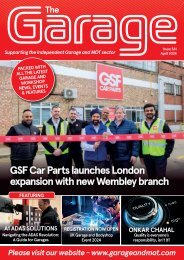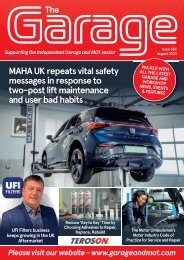Professional Recovery 333
You also want an ePaper? Increase the reach of your titles
YUMPU automatically turns print PDFs into web optimized ePapers that Google loves.
RECOVERYINSIDER<br />
but surely becoming a thing of the past, forced by coronavirus<br />
or through the tighter economics of the recovery industry? I<br />
think a combination of both, but what this does mean is that<br />
the distance recoveries are becoming a thing of the past and<br />
recoveries to the South of England and in particular those to<br />
Kent, will be vastly reduced.<br />
Driver EU permit system<br />
Why do I highlight Kent? I guess this is more of a local issue,<br />
certainly operators working in the South East, including London<br />
operators that borders Kent plus operators in Surrey, Sussex and<br />
Essex, I’m talking about Government plans to introduce a truck<br />
and driver EU permit system ‘Kent Access Permit’ (KAP). This<br />
follows a government consultation carried out back in August<br />
of this year. The consultation covered a series of operational<br />
questions, questions that directly affect Kent and operation<br />
Brock to reduce the massive congestion issues on the M20 with<br />
Operation Stack and now Operation Brock and the additional<br />
congestion expected at the Eurotunnel border control this<br />
January. Not a subject that affects all operators but something<br />
that will affect all port authorities and borders, because a similar<br />
boarder control permit could be introduced elsewhere.<br />
Those South East operators will be especially affected as the<br />
‘Kent Access Permit’ is another piece of legislation imposed on<br />
hauliers. When I say hauliers, I also include recovery operators.<br />
Because KAP will be required when using designated roads in<br />
Kent leading to the Port of Dover and Eurotunnel, if you are<br />
intending to travel into Europe, then and only then you must be<br />
in possession of a ‘Kent access permit’ (KAP).<br />
Border control issues<br />
Not all operators work in mainland Europe so a lot of the<br />
border control issues the general haulage and European logistics<br />
firms find themselves having to tackle, will not affect your<br />
business, however there are a few who do European repatriation<br />
work, so they will be in the thick of the changes.<br />
If you are intending to travel to or from Europe in your LGV<br />
over 7.5 tonnes then you will first have to access the Smart<br />
Freight Service, referred to as SF, this is an online service for<br />
the ‘Ro-Ro’ freight industry, a website being developed by the<br />
government. The service is intended to simplify and automate<br />
the process of establishing the border-readiness of an LGV to<br />
help mitigate the risk of delays.<br />
The online system will ask questions relating to the expected<br />
EU import controls at the border to ensure all drivers have the<br />
necessary documents before they travel. The service will include<br />
an online portal for registration of goods movements and an<br />
operator application to check compliance with the service.<br />
The operator would use the SF portal to make a series of selfdeclarations<br />
in advance of any travel plans. The SF portal would<br />
then indicate, based on the self-declared information, if your<br />
driver was/is border-ready or not. The SF portal would give<br />
advice to the driver on a ‘traffic light system’:<br />
Failure to follow an instruction from<br />
a traffic or enforcement officer could<br />
mean driver penalties. Fines for not<br />
having a valid KAP would be levied<br />
using fixed penalty notices for UK LGV<br />
drivers, and financial penalty deposit<br />
notices for foreign drivers. Fines would<br />
normally be on the spot, though UK<br />
drivers would have up to 28 days to pay.<br />
If a driver refused to pay, their vehicle<br />
and goods could be impounded.<br />
Green: all relevant documentation has been declared present,<br />
and goods may be taken to the port.<br />
Amber: documentation has been declared present, but goods<br />
can only be taken to the port after your driver has gone to the<br />
HMRC Departure Office, or a Third-Party Authorised Consignor<br />
to complete customs processes and obtain a Master Reference<br />
Number (MRN) barcode.<br />
Red: some or all documentation is missing, and goods should<br />
not be taken to port.<br />
Red result<br />
A driver who gets a ‘red’ result would be advised not to take<br />
goods to the port as they may not be able to complete their<br />
journey and could cause a delay to other traffic, the SF portal<br />
should indicate to the LGV driver why they got a ‘red’ result.<br />
While the SF portal’s traffic light system would be in operation<br />
across the country, including all port crossings, it is proposed to<br />
make it fully enforceable in Kent. This is because of the particular<br />
disruption to the surrounding road network and the risks at the<br />
Port of Dover and Eurotunnel.<br />
Meaning this legislation would require any haulier using<br />
designated roads in Kent leading to the Port of Dover and<br />
Eurotunnel to be in possession of a ‘Kent access permit’ (KAP),<br />
this permit will be digitally issued to those drivers receiving a<br />
‘green’ or ‘amber’ result from the SF service, all valid KAP’s would<br />
only be valid for 24 hours to cover a single trip.<br />
Inevitably this brings into play that unwelcomed phrase<br />
‘enforcement’ with the responsibility lying with the driver,<br />
meaning any enforcement action would also be against the<br />
12 PROFESSIONAL RECOVERY MAGAZINE<br />
10, 11, 12, 13 DF.indd 3 12/11/2020 16:16


















